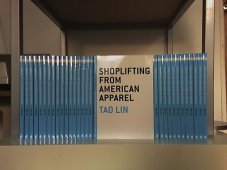In things just occur and they are not very interesting or important. Periodically these are generally funny. Typically they've been depressing. Tao Lin's 112-page novella from Melville home's "modern Art associated with the Novella" show is drained of emotion and unfettered by inflection and exclamation, a portrait of a soulless modernity using the consolation of technology and yummy vegan goodies. Lin writes with a-flat passionless prose, a posed naïveté belying a canny sophistication. Shoplifting is just too dour becoming twee, but it shares an affected childishness with groups just like the Moldy Peaches and possesses a put-on weirdness similar to Miranda July's No One Belongs Here significantly more than You. There's no universal knowledge here, but a privacy and a particularity to Lin's writing as if the book were written for five folks. And also at once Lin as a writer appears to be secondary to Lin as a microcelebrity artman. He generally seems to use writing in an effort to develop a persona and record the ironic, idiosyncratic cultural moment.
Even yet in this brief and free work, it's fatiguing to read through the commoditized alleged underground undeservedly claiming elevation over mainstream customer and work alternatives. From Ghost Mice to Lorrie Moore to Wendy's Spicy Chicken Sandwich, stock objects reign in Lin's imagination better than subjects. Everything you consume and whom you understand can enhance your life and Pilates will make you a significantly better person. Lin's figures price way of life above emotions, interactions, or personal activism. The means of Sam's self-actualization are available. Right here the ephemeral keeps primacy across durable. Some time place tend to be evoked perhaps not by detail by detail descriptions, tone, or theme, but by brands and rings. Shoplifting can be so vague that it's difficult to understand something ironic, what's maybe not, and just what is a commentary regarding postmodern urban condition.
Shoplifting's slide of a protagonist is Sam, an author just who uses their time shoplifting, drinking soymilk with teas, masturbating, sleeping, and making use of Gmail Chat. And then he is a cult publisher who not appear to spend enough time writing. He along with his friends connect through commercial tradition, maybe not history. They share the saleable and fashionable, and never the ancestral or old-fashioned, what can be reclaimed through memory. The pals get together and move aside so impassively it is hard to share with if any person really cares. An arrest, a mental hospital stay, nothing generally seems to truly make a difference.
Discover so little aboutness in Lin's work. From Sam's narration, an audience can extract themes of loneliness, the nature of pleasure, the part and responsibility of the singer, and the vacuity and meaning of internet interactions. But I was aggravated using this small guide therefore covered with layers of irony and without a thesis. With Shoplifting, Lin punishes their reader with banality interrupted by physical violence and possibly looking for an objective. Your reader is really separated from work, through the act of looking over this distancing pocket novella.
Unwillingly, Lin confirms the impossibility of bohemia together with his form of a publisher's life. Freedom and joy are not even possible for a cult copywriter who is able to rest until 3:30 pm, consume cereal for a midday dinner, and scream at strangers for kicks. Also without the bondage of fulltime work, life is monotonous and bleak. Tao Lin defines this book as "2 parts shoplifting arrest, 5 parts unclear commitment dilemmas." (Numerics his or her own maybe not mine.) I might describe it as a car for his performance art and self promotion, an amorphous work without numerous things of access for reader.










